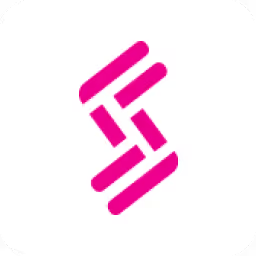B2B Rocket Alternatives
Considering a switch from B2B Rocket? This guide compares 10 alternatives, analyzing features and pricing to help you make an informed decision.
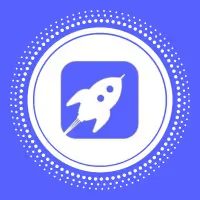
B2B Rocket is a popular tool for good reason. Many teams use it for its strong automation and lead generation features. It performs well in these areas, helping users save a significant amount of time on outreach tasks and focus on core activities.
However, some users report a learning curve and limited customization options. For this reason, we've analyzed the top alternatives based on G2 reviews, comparing their pros and cons to help you shortlist your options for a deeper review. Let's get started.
Consider 11x for Your Sales Team
If your team wants to use digital workers for sales, 11x offers a specific solution. It provides autonomous agents to handle parts of your outreach and qualification process.
This may be a good fit if you want to add digital labor to your sales operations. We suggest a closer look to see if this approach aligns with your company's goals.
11x is a go-to-market platform that uses AI agents to manage the sales process. We find it consolidates sales operations into a single system.
The platform has two main agents. Alice sources prospects, conducts outreach via email and LinkedIn, and updates the CRM. Julian handles inbound lead qualification and schedules meetings.
With this tool, we note you may not need separate solutions for data enrichment, outreach, or email warmup. The platform combines these functions.
B2B Rocket Alternatives
We will now review several alternatives to B2B Rocket. Each tool is analyzed based on its pricing, main features, and its specific advantages and drawbacks to help you compare your options.
1) Apollo.io
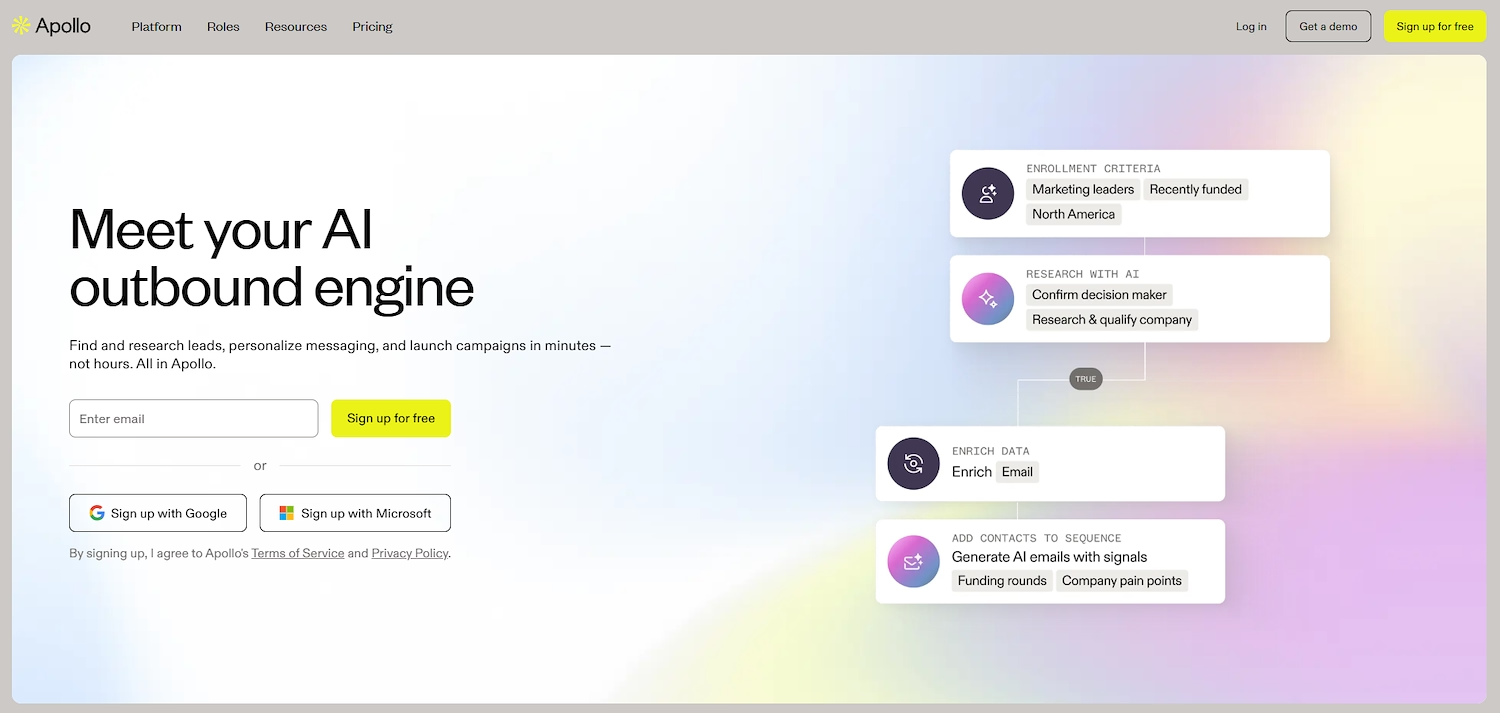
Apollo.io is a sales intelligence and engagement platform. It offers access to a large contact database for prospect discovery. Teams use the platform to find potential customers and build lead lists.
The system also includes tools for outreach, such as email sequences and analytics. These features help sales professionals connect with prospects. It combines data and workflow tools into one place.
Apollo.io's Main Features
- Offers a contact database to find prospects and create lead lists.
- Includes sequencing tools for automating email outreach to prospects.
- Features analytics for monitoring email campaign engagement and results.
How Apollo.io Compares to B2B Rocket
Average Review score: 4.7/5 stars based on 8,904 G2 reviews.
- Apollo.io provides a database with over 210 million contacts. This may offer a wider scope for lead discovery compared to B2B Rocket's lead generation focus.
- It combines sales intelligence, engagement, and analytics in one platform. This differs from B2B Rocket, which concentrates more on automation and lead generation tasks.
- The platform includes lead enrichment features to add more detail to contacts. This function is integrated, whereas with B2B Rocket, you might need a separate tool for similar data depth.
- A free plan is available for a single user. This allows teams to test the platform's core features without an initial investment, an option not always available with specialized tools.
Potential Downsides of Apollo.io
- Apollo.io provides a broad set of tools for sales intelligence and engagement. This approach differs from B2B Rocket, which concentrates more on the specific automation of outreach tasks.
- Some users report that contact information in the database can be inaccurate at times. This might require teams to spend extra time on data verification compared to B2B Rocket's process.
- The platform's extensive features can create a learning curve for some teams. A more specialized tool like B2B Rocket may offer a quicker setup for users who need to automate specific tasks.
Budget and Pricing Considerations
B2B Rocket does not publicly list its pricing, requiring teams to inquire directly. In contrast, Apollo.io provides a free plan for a single user, with its paid tiers starting at $49 per user per month for the Basic plan.
2) ZoomInfo SalesOS
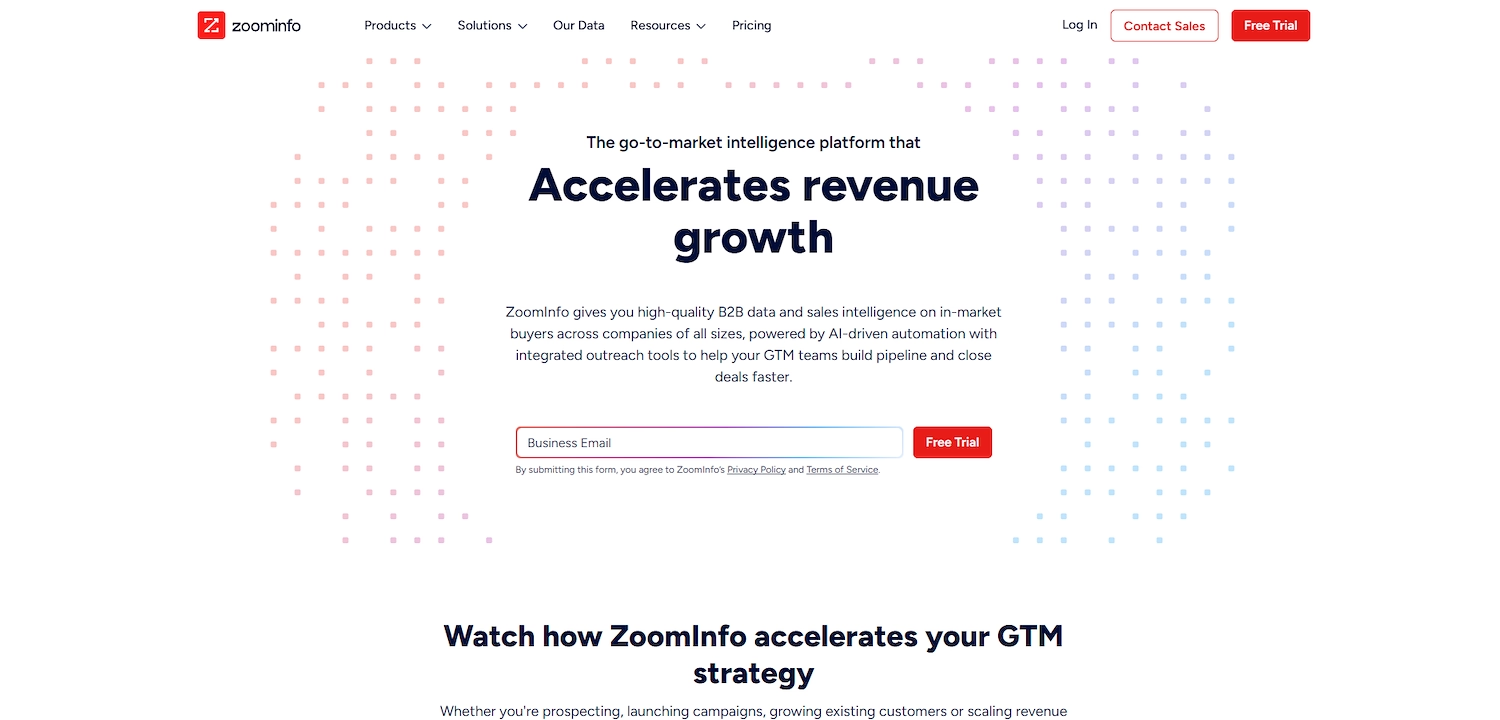
ZoomInfo SalesOS is an AI-powered go-to-market platform. It helps B2B organizations identify and connect with buyers by unifying company data, intent signals, and automation tools. This provides a single system for sales, marketing, and operations teams.
Use cases include prospecting, pipeline generation, and AI-assisted sales. The platform aims to automate manual tasks and provide a central data source for GTM activities.
ZoomInfo SalesOS's Main Features
- Provides a generative-AI companion to surface insights and draft outreach.
- Analyzes call and meeting interactions using conversation intelligence.
- Identifies ready-to-buy prospects through real-time buyer intent signals.
- Turns anonymous website visitors into potential leads with visitor tracking.
How ZoomInfo SalesOS Compares to B2B Rocket
Average Review score: 4.5/5 stars based on 8,738 G2 reviews.
- ZoomInfo SalesOS provides a large, frequently refreshed database of B2B contacts and companies. This differs from B2B Rocket, which focuses more on the automation of outreach.
- It includes an AI companion that gives recommendations on who to contact and what to say, offering a guided sales process unlike B2B Rocket's automation tools.
- The platform identifies prospects using real-time buyer intent signals. This provides a different way to find leads compared to B2B Rocket's generation methods.
- This tool offers conversation intelligence to analyze sales calls and meetings, providing insights that are not a core feature of B2B Rocket's outreach automation.
Potential Downsides Of ZoomInfo SalesOS
- ZoomInfo SalesOS is a comprehensive go-to-market platform. This broad scope might introduce a steeper learning curve compared to B2B Rocket's specific focus on outreach automation.
- Some users report that its contact data can sometimes be outdated. This may require teams to spend additional time on verification, unlike the more direct lead generation process in B2B Rocket.
- The platform's extensive features can result in a higher cost and a longer implementation time. Teams that need a quick-to-deploy automation tool like B2B Rocket might find this a consideration.
Budget and Pricing Considerations
B2B Rocket does not make its pricing public, and ZoomInfo SalesOS follows a similar custom-pricing model. While we've covered key features and use cases in this comparison, pricing models can vary significantly between tools. For the most accurate and up-to-date pricing information, we recommend visiting the ZoomInfo SalesOS's official website.
3) Outreach
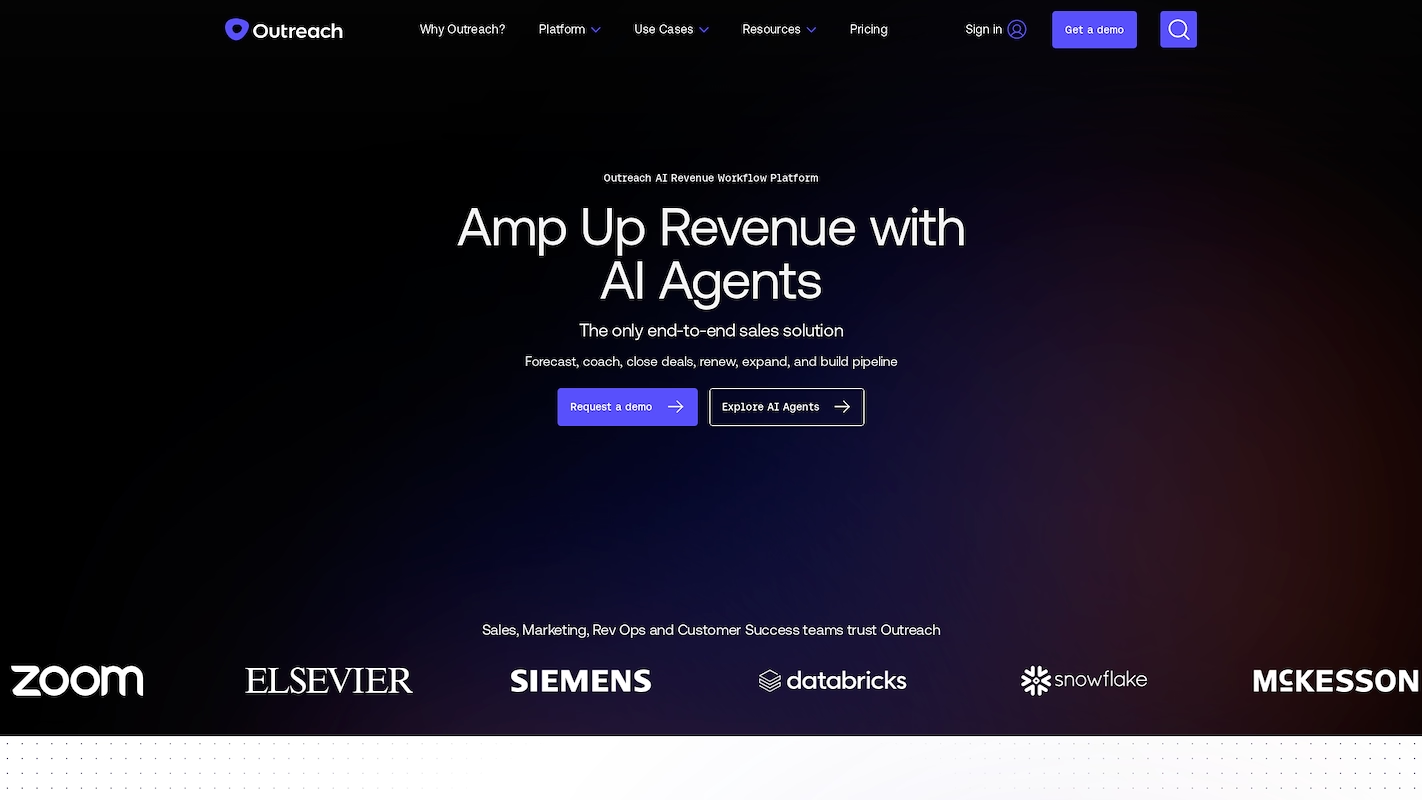
Outreach is an AI-powered platform for end-to-end sales execution. It uses AI agents and data workflows to help with revenue forecasts and pipeline growth. Use cases include sending outbound communication to increase qualified pipeline and the management of deals with AI insights. The platform emphasizes data security.
Outreach's Main Features
- Offers AI agents for each stage of the revenue cycle, from prospecting to account expansion.
- Provides AI-driven representative coaching with meeting summaries and analytics through its Kaia tool.
- Analyzes buyer sentiment by detecting topics and intent across meetings, calls, and emails.
- Delivers real-time content guidance during live calls with meeting prompts and content cards.
How Outreach Compares to B2B Rocket
Average Review score: 4.3/5 stars based on 3,479 G2 reviews.
- Outreach provides a unified platform for the entire sales cycle, from prospecting to deal management. This is different from B2B Rocket, which focuses mainly on lead generation and outreach automation.
- The platform includes AI-driven coaching that analyzes sales calls to provide feedback. This offers a layer of representative development not present in B2B Rocket's automation-focused toolset.
- It analyzes buyer sentiment from calls and emails to detect intent. This gives sales teams insights that go beyond the outreach automation capabilities of B2B Rocket.
- This tool offers real-time content suggestions during live calls. This feature provides immediate support for sales reps, a function distinct from B2B Rocket's pre-set automation sequences.
Potential Downsides Of Outreach
- Outreach covers the entire sales cycle, which can be complex for teams that only need lead generation automation. B2B Rocket offers a more direct solution for this specific task.
- The platform's wide range of features might require more training time for sales teams. In comparison, B2B Rocket's focus on automation can allow for a quicker start.
- Some users report occasional integration or sync issues. This might create data management tasks that a focused tool like B2B Rocket aims to reduce through its specific automation.
Budget and Pricing Considerations
Both B2B Rocket and Outreach do not list their prices publicly, operating on a custom-quote model. For the most accurate and up-to-date pricing information, we recommend visiting Outreach's official website.
4) Salesloft
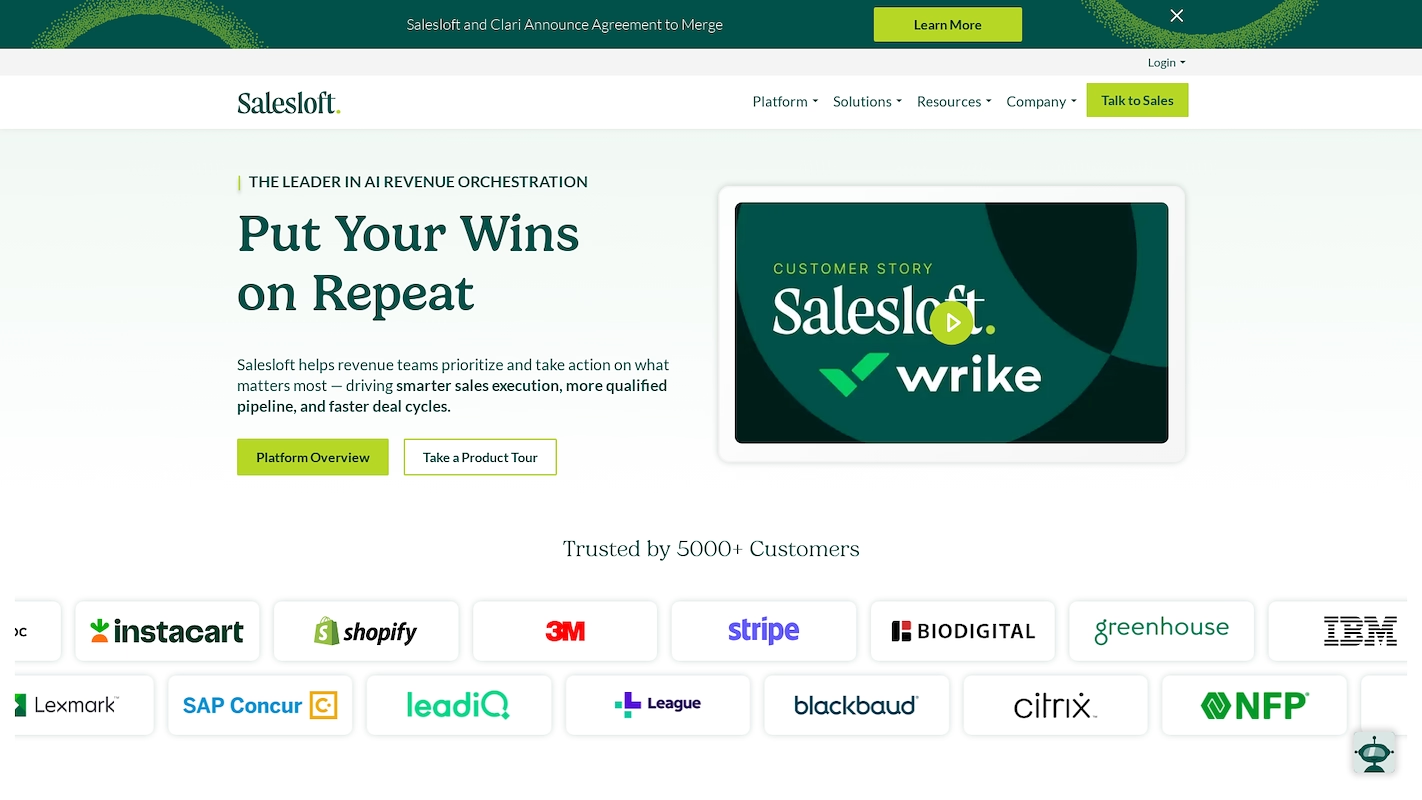
Salesloft is a sales engagement platform that gives revenue teams a single workspace for the sales cycle. It covers work from initial outreach to deal closure and expansion. Sellers use it to execute sales plays and manage their pipeline.
Use cases include pipeline generation and deal health analysis. The platform also applies AI to guide sellers and automate routine tasks.
Salesloft's Main Features
- Uses an AI prioritization engine, Rhythm, to recommend actions at specific moments.
- Provides conversation intelligence to analyze recorded calls for buyer insights and coaching opportunities.
- Offers a deal management module with AI insights into pipeline risk and next steps.
- Combines real-time deal data with AI and seller input for sales forecasting.
How Salesloft Compares to B2B Rocket
Average Review score: 4.5/5 stars based on 4,145 G2 reviews.
- Salesloft includes an AI engine, Rhythm, that suggests specific actions for sellers. This offers a guided sales process, unlike B2B Rocket's more general automation.
- It analyzes recorded calls to provide coaching insights. This feature for representative development is not a core part of B2B Rocket's toolset.
- The platform offers a deal management module with AI insights on pipeline risk. This is a more advanced feature compared to B2B Rocket's focus on lead generation.
- This tool combines real-time deal data with AI for sales forecasting. B2B Rocket concentrates on outreach and does not have a comparable forecasting function.
Potential Downsides Of Salesloft
- Salesloft's platform addresses the full sales cycle. This can mean a steeper learning curve compared to B2B Rocket, which has a specific focus on outreach automation.
- Some users note occasional issues with integrations or core functions like calling. A specialized tool like B2B Rocket might present fewer technical hurdles for teams focused on automation.
- The tool includes advanced features like deal management and forecasting. These may be unnecessary for teams that only need to automate top-of-funnel outreach, a task for which B2B Rocket is specifically designed.
Budget and Pricing Considerations
B2B Rocket does not make its pricing public, and Salesloft follows a similar custom-pricing model.
While we've covered key features and use cases in this comparison, pricing models can vary significantly between tools. For the most accurate and up-to-date pricing information, we recommend visiting Salesloft's official website.
5) HubSpot Sales Hub
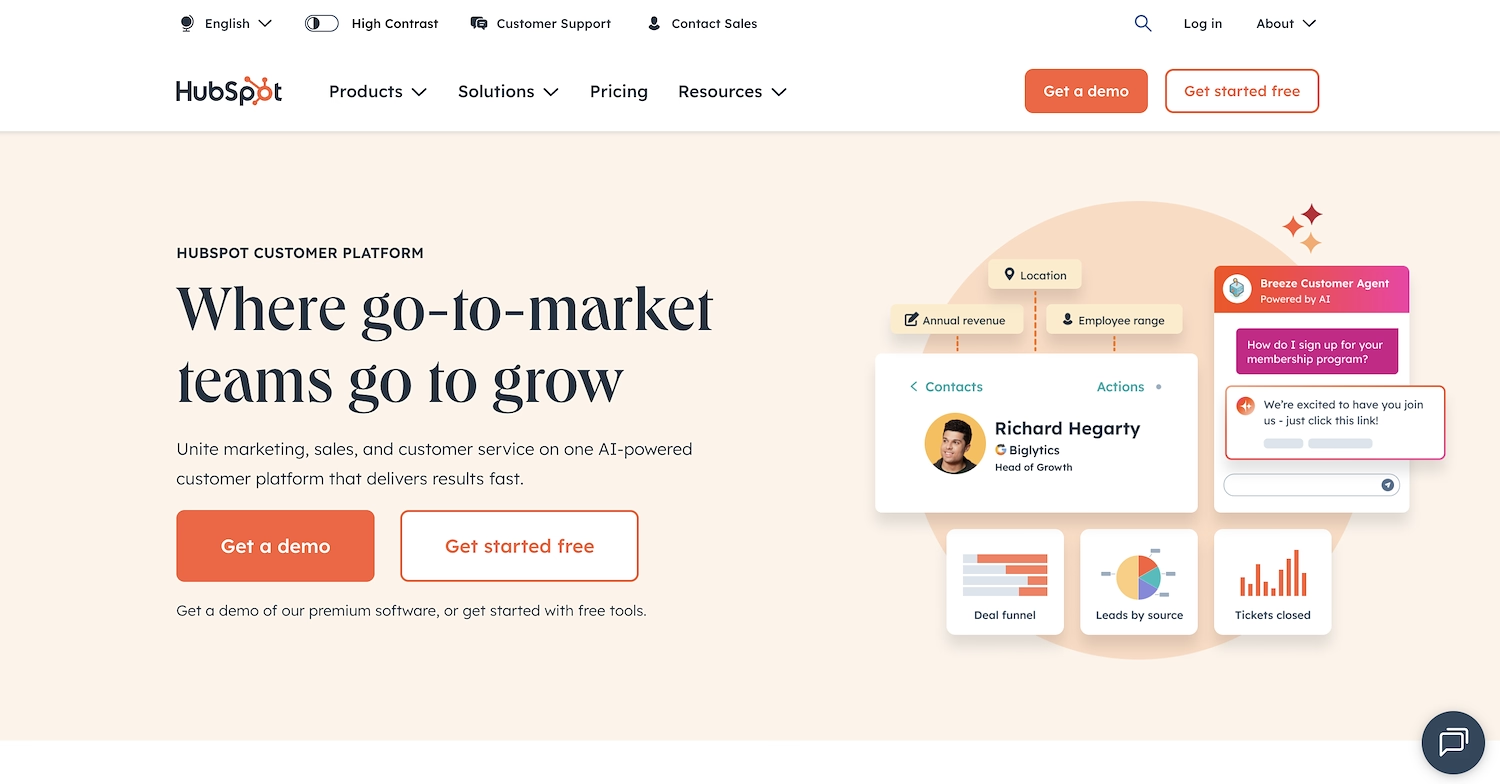
HubSpot Sales Hub is a sales platform that combines sales tools and data into a single system. It is designed to help teams manage their pipeline and customer relationships. Use cases include sales automation, lead management, and prospect outreach.
The platform also provides sales AI to support the sales process. This gives teams a central workspace for their activities, from initial contact to deal closure. It connects various sales functions to provide a complete view.
HubSpot Sales Hub's Main Features
- Includes an AI-guided selling workspace with smart queues and daily action summaries.
- Manages the deal pipeline with tools for quote creation, e-signatures, and payments.
- Contains playbooks, scripts, and battlecards within a coaching dashboard for sales teams.
- Delivers conversation intelligence with call transcription and AI-powered forecasting.
How HubSpot Sales Hub Compares to B2B Rocket
Average Review score: 4.4/5 stars based on 12,407 G2 reviews.
- HubSpot Sales Hub provides a complete CRM platform that covers the entire sales cycle. This is different from B2B Rocket, which focuses on lead generation and outreach automation.
- It includes tools to manage the deal pipeline, from quote creation to payment processing. B2B Rocket's features are centered on the earlier stages of outreach.
- The platform offers conversation intelligence to analyze calls and provide coaching insights. This provides a performance improvement layer not found in B2B Rocket's automation toolset.
- This tool integrates customer support and case management features. This allows teams to manage the full customer lifecycle, unlike B2B Rocket's focus on pre-sale activities.
Potential Downsides Of HubSpot Sales Hub
- HubSpot Sales Hub is a full CRM system, which can be overly complex for teams that only need to automate outreach. B2B Rocket offers a more focused tool designed specifically for that purpose.
- Some users find that essential features are locked behind more expensive tiers. This may result in a higher cost compared to B2B Rocket if a team does not need the full suite of CRM tools.
- The tool's primary function is to manage the entire sales cycle, not just automate it. For teams that want to reduce manual outreach tasks, B2B Rocket provides a more specialized approach.
Budget and Pricing Considerations
B2B Rocket does not publicly list its pricing. HubSpot Sales Hub provides transparent tiers, starting with a free CRM and a Starter plan at $20 per seat per month, which makes it a more budget-friendly entry point for teams.
Consider 11x for a Digital Workforce
The alternatives reviewed offer comprehensive platforms for sales engagement. However, if your strategy involves integrating autonomous digital workers, 11x provides a specialized solution for this purpose.
Its AI agents handle specific sales roles, which differs from tools that assist human reps. We suggest evaluating 11x if you aim to delegate entire functions of the sales process.
With 11x, we find AI agents run the sales playbook. Alice sources accounts and handles outreach, while Julian qualifies leads and schedules meetings. It combines tools for intent signals and email warmup, replacing other parts of the GTM stack.
Book a demo to see 11x in action.
6) Snov.io
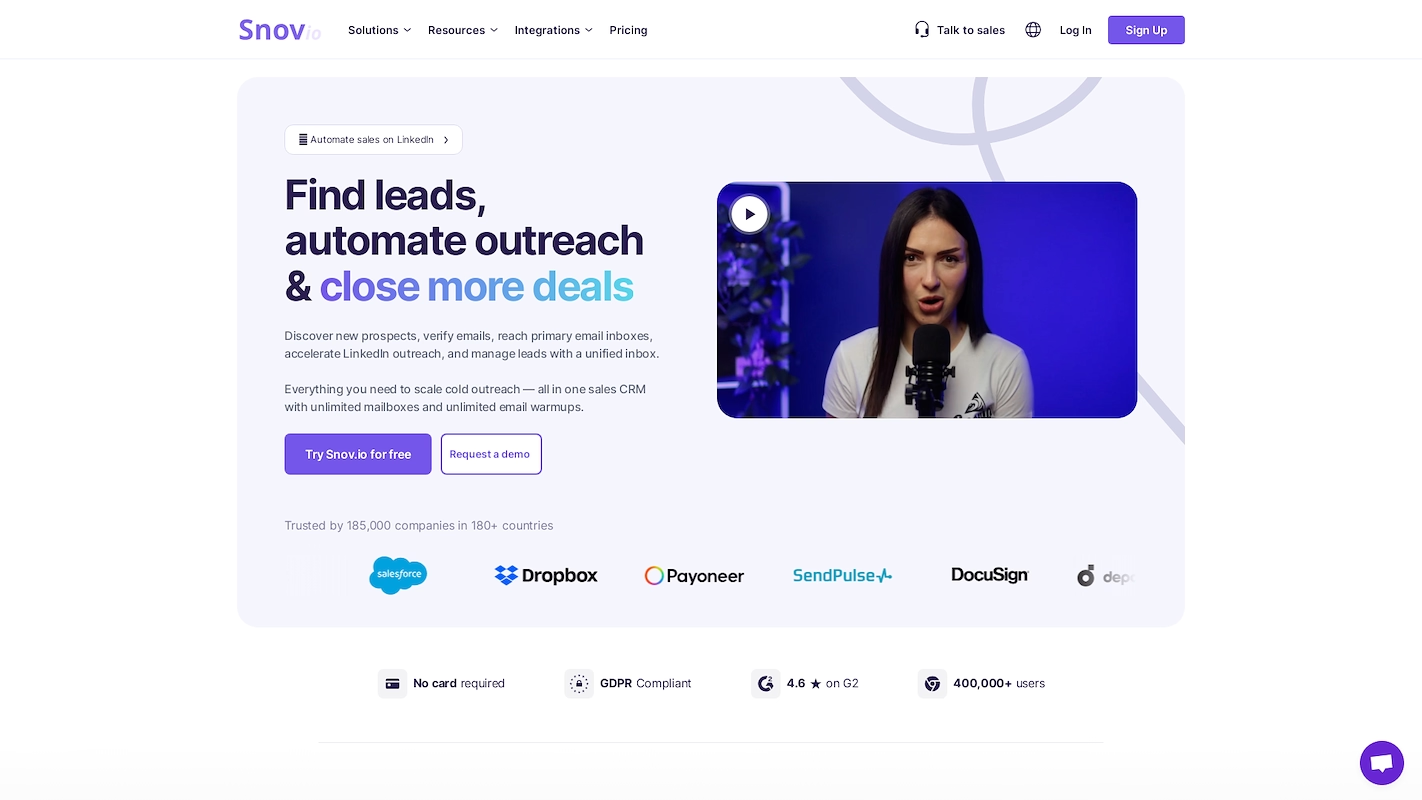
Snov.io is a sales automation platform for lead generation and outreach. It provides tools for email discovery, contact list verification, and the launch of email drip campaigns. Sales teams use the platform to manage prospect connections and execute outreach strategy from a single place.
Snov.io's Main Features
- Verifies emails with a 7-tier process that includes a gray-listing bypass for 98% accuracy.
- Includes a deliverability toolkit with automated email warm-up and domain placement checkers.
- Provides multichannel campaigns with unlimited sender accounts and a unified inbox for reply management.
- Offers a built-in sales CRM with Google Calendar sync and automated deal stages.
How Snov.io Compares To B2B Rocket
Average Review score: 4.6/5 stars based on 450 G2 reviews.
- Snov.io includes a 7-tier email verification process that ensures high accuracy. This is a more detailed verification step compared to B2B Rocket's general lead generation focus.
- It provides a deliverability toolkit with an email warm-up feature. This function helps improve sender reputation, which is different from B2B Rocket's core outreach automation.
- The platform offers a built-in sales CRM to manage deals and contacts. This contrasts with B2B Rocket, which concentrates on automation and integrates with external CRM systems.
- This tool supports multichannel campaigns with unlimited sender accounts. This feature provides more flexibility for outreach scale than the specific automation tasks in B2B Rocket.
Potential Downsides Of Snov.io
- Snov.io includes a built-in CRM, which might be unnecessary for teams that only need an outreach automation tool. B2B Rocket offers a more focused solution for this specific task, which can simplify adoption.
- The platform's automation features are part of a larger toolset. Compared to B2B Rocket's dedicated focus, some users might find the automation less extensive for highly specific or complex outreach campaigns.
- Its all-in-one approach may not suit teams that are satisfied with their current CRM. B2B Rocket's specialized nature can sometimes make it easier to integrate into an existing sales technology stack without causing disruption.
Budget and Pricing Considerations
B2B Rocket operates on a custom-quote model and does not make its pricing public. In contrast, Snov.io offers transparent pricing tiers, including a free trial and paid plans that start at $39 per month for its Starter package.
7) Reply.io
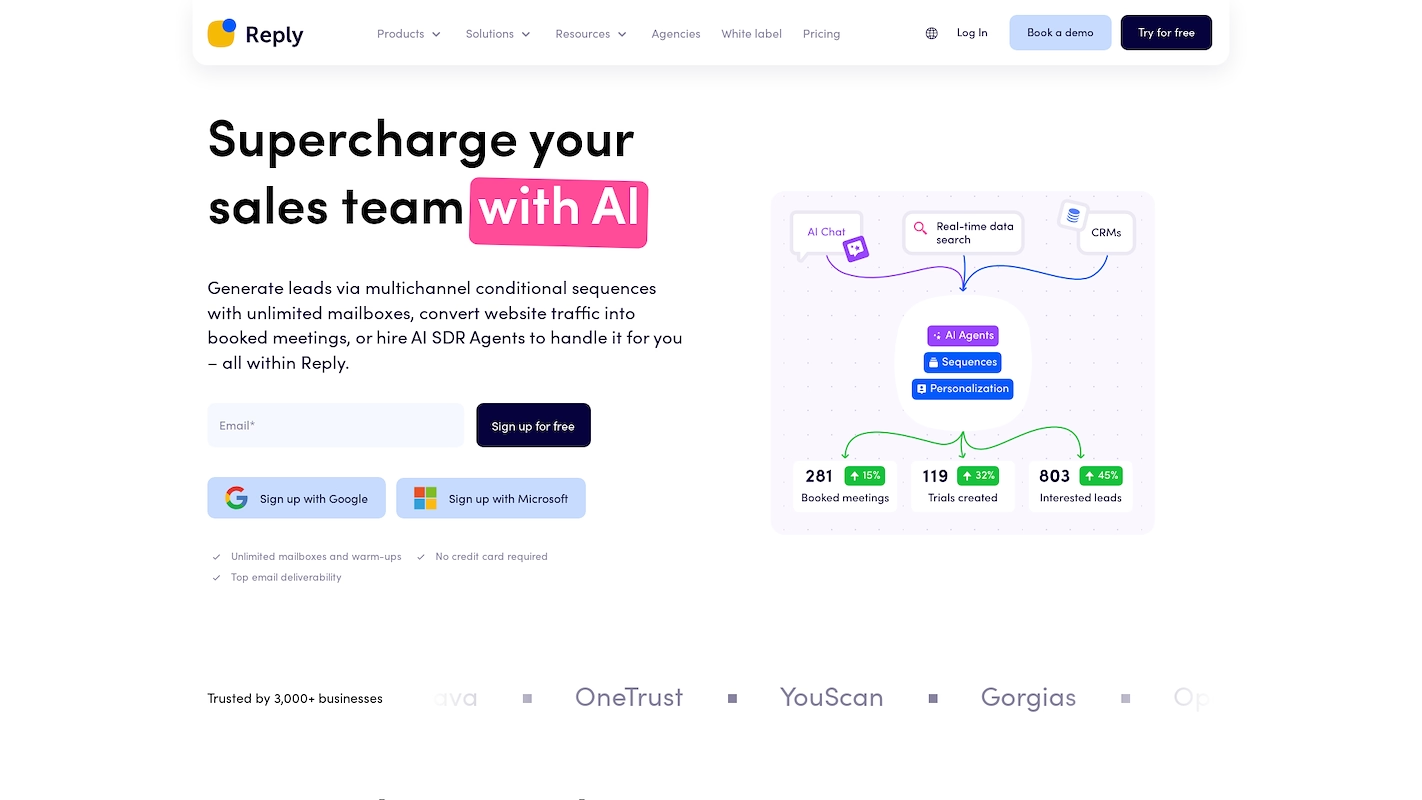
Reply.io is a full-cycle sales engagement platform that helps teams find leads and engage them across multiple channels. It uses an AI assistant to handle responses and book meetings. Use cases include outbound sales, account-based marketing, and business development to create opportunities at scale.
Reply.io's Main Features
- Offers an AI SDR agent for automated prospecting, message generation, reply handling, and meeting booking.
- Combines email, LinkedIn, calls, SMS, and WhatsApp into a single conditional sequence.
- Includes a deliverability toolkit with over 30 items and offers unlimited mailbox warm-up.
- Provides access to a B2B database of over 1 billion contacts with intent signals.
How Reply.io Compares To B2B Rocket
Average Review score: 4.6/5 stars based on 1,458 G2 reviews.
- Reply.io provides an AI SDR agent that handles prospecting, response management, and meeting booking. This offers a more autonomous process compared to B2B Rocket's focus on automating outreach tasks.
- The platform combines email, LinkedIn, calls, SMS, and WhatsApp into a single sequence. This provides more outreach channels than B2B Rocket's more focused automation.
- It includes a deliverability toolkit with an email warm-up feature to help maintain sender reputation, a specialized function not central to B2B Rocket's lead generation tools.
- This tool offers access to a large B2B contact database. This feature for lead sourcing is different from B2B Rocket's approach, which centers on automating the outreach process itself.
Potential Downsides Of Reply.io
- Reply.io is a comprehensive platform, and some users report a learning curve. In contrast, B2B Rocket's focus on a single function may allow for a quicker implementation for teams that only need outreach automation.
- The tool's all-in-one design might be redundant for teams with an established sales stack. B2B Rocket's specialized nature can make it a simpler addition to existing technology without replacing current systems.
- Its pricing can become a consideration for teams that scale, especially if they do not need its full range of features. With B2B Rocket, companies might find a more cost-effective solution if they only require specific automation tasks.
Budget and Pricing Considerations
B2B Rocket operates on a custom-quote model without public pricing, while Reply.io offers transparent tiers, including a free plan and paid options starting at $49 per user per month. This makes Reply.io a more predictable option for teams managing a set budget.
8) Lemlist
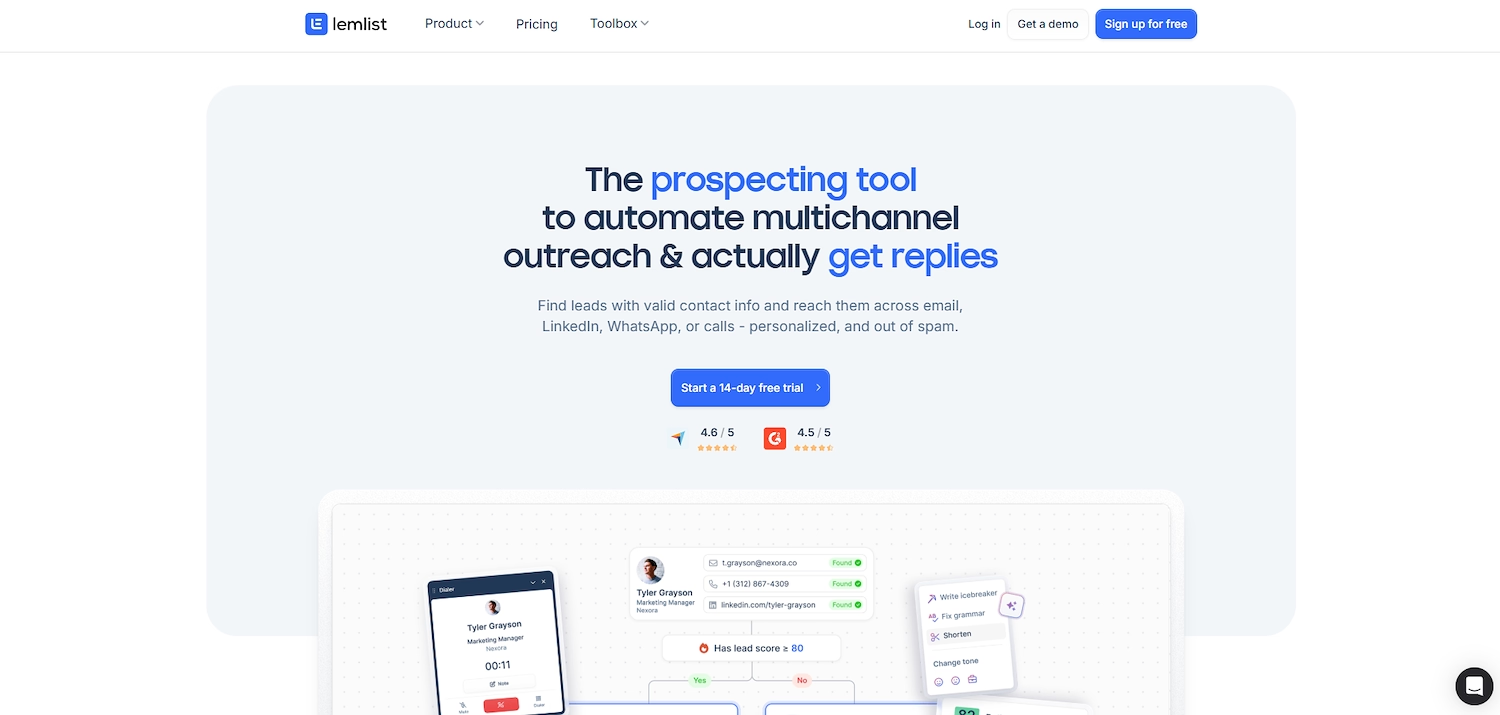
Lemlist is a sales engagement platform for businesses to contact and convert leads. It uses AI to automate outreach and personalize communication at scale. This supports sales teams with lead generation and outreach tasks.
Use cases involve automated sequences to set appointments. The system warms up leads to secure meetings for sales representatives, which aligns with the function of an AI SDR.
Lemlist's Main Features
- Automates outreach across email, LinkedIn, and calls using multi-channel sequences.
- Personalizes messages with dynamic text, images, and videos.
- Incorporates phone calls directly into outreach sequences.
- Includes email deliverability tools to monitor sending practices and improve inbox placement.
How Lemlist Compares to B2B Rocket
Average Review score: 4.4/5 stars based on 276 G2 reviews.
- Lemlist allows for message personalization with dynamic images and videos, offering a different way to engage prospects compared to the standard automation in B2B Rocket.
- It combines email, LinkedIn, and calls into a single outreach sequence, providing more channels than B2B Rocket's more focused automation approach.
- The platform includes email deliverability tools to help improve inbox placement, a specialized function not central to B2B Rocket's lead generation process.
- This tool integrates phone calls directly into its outreach sequences, adding a communication option distinct from B2B Rocket's automated task focus.
Potential Downsides Of Lemlist
- Lemlist covers many sales tasks, which can be complex for teams that only need outreach automation. B2B Rocket provides a more focused solution for this specific need.
- Some users report technical issues with its data enrichment system. This might disrupt prospecting efforts, which is different from B2B Rocket's direct approach to lead generation.
- The tool's all-in-one design may not be ideal for teams with an established sales stack. A specialized tool like B2B Rocket can sometimes integrate more simply for teams that only want to add an automation layer.
Budget and Pricing Considerations
B2B Rocket operates on a custom-quote model and does not make its pricing public. In contrast, Lemlist offers transparent pricing, including a free plan, an Email Pro plan at $55 per year, and a Multichannel Expert plan at $79 per month.
9) Mailshake
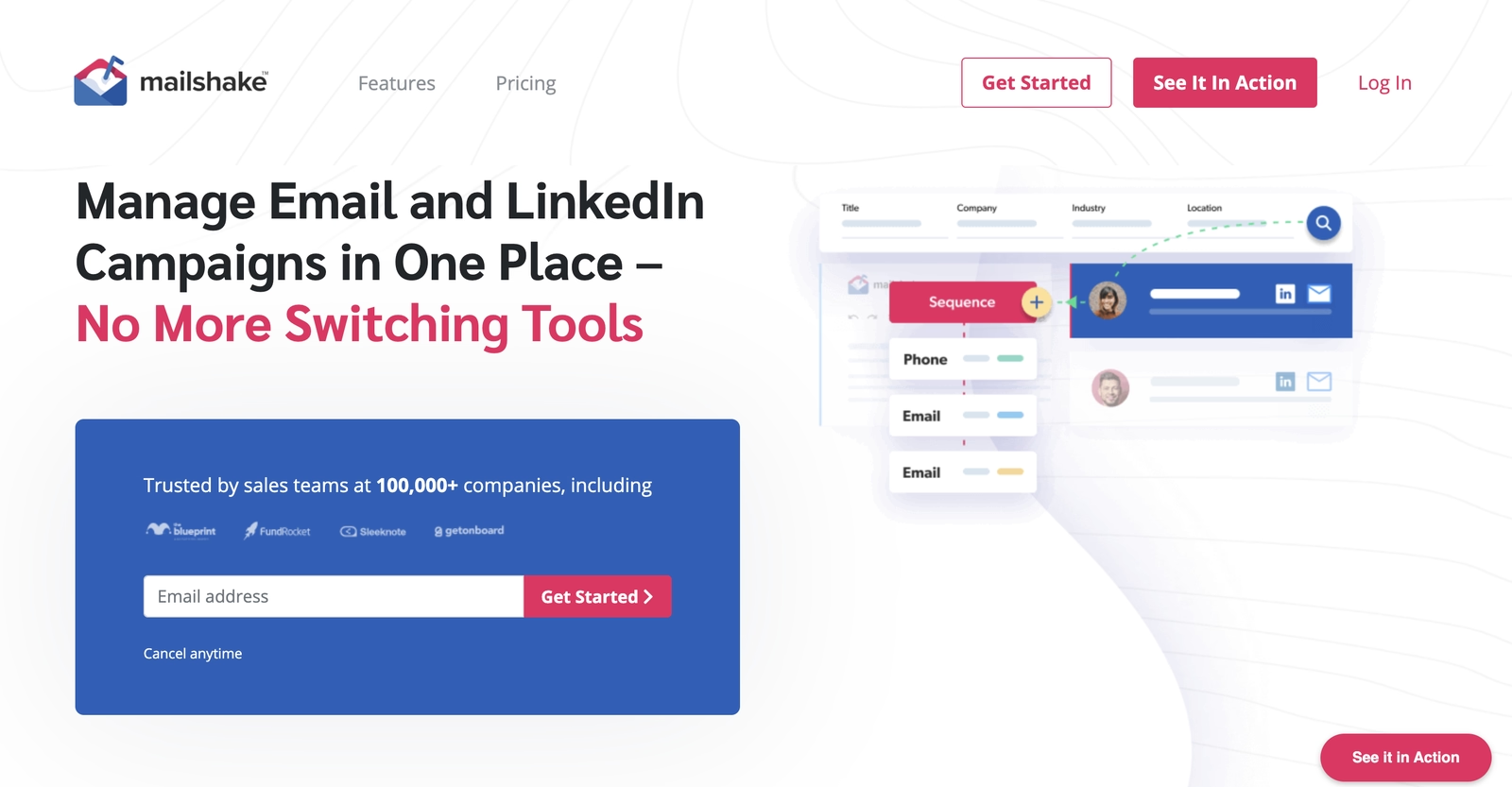
Mailshake is a sales engagement platform that uses automation for outreach. It helps sales teams connect with prospects and manage cold email campaigns. Teams use it for lead generation and to schedule appointments, core functions for sales development.
Mailshake's Main Features
- Sets tasks to engage with prospects via phone and social media within a single sequence.
- Uses lead scoring and prioritization to help sales teams focus their efforts.
- Schedules outreach for the best time of day to improve engagement rates.
How Mailshake Compares to B2B Rocket
Average Review score: 4.7/5 stars based on 326 G2 reviews.
- Mailshake includes lead scoring to help sales teams prioritize prospects. This is different from B2B Rocket, which focuses on general outreach automation without a built-in scoring system.
- It schedules outreach for the best time of day to improve engagement rates. This offers a more data-driven approach to timing compared to B2B Rocket's standard automation.
- The platform sets tasks for phone and social media engagement within a single sequence. This provides a more unified multi-channel workflow than B2B Rocket's automation features.
- This tool offers native integrations with major CRMs like Salesforce and HubSpot. This can provide a smoother connection than the more general integrations available with B2B Rocket.
Potential Downsides Of Mailshake
- Some users report limited customization for automation. This differs from B2B Rocket, which focuses on complex and tailored outreach sequences.
- It offers native CRM connections, but some users note occasional integration issues. This can create data sync problems, a challenge a focused tool like B2B Rocket is designed to minimize.
- This tool includes a broad set of sales engagement features. For teams that only need outreach automation, this may add complexity compared to B2B Rocket's specialized function.
Budget and Pricing Considerations
B2B Rocket does not publicly list its pricing, requiring teams to request a custom quote.
In contrast, Mailshake offers transparent pricing tiers. Its plans include a Starter option at $29 per month, an Email Outreach plan at $59 per month, and a Sales Engagement plan at $99 per month, providing a predictable cost structure.
10) Yesware
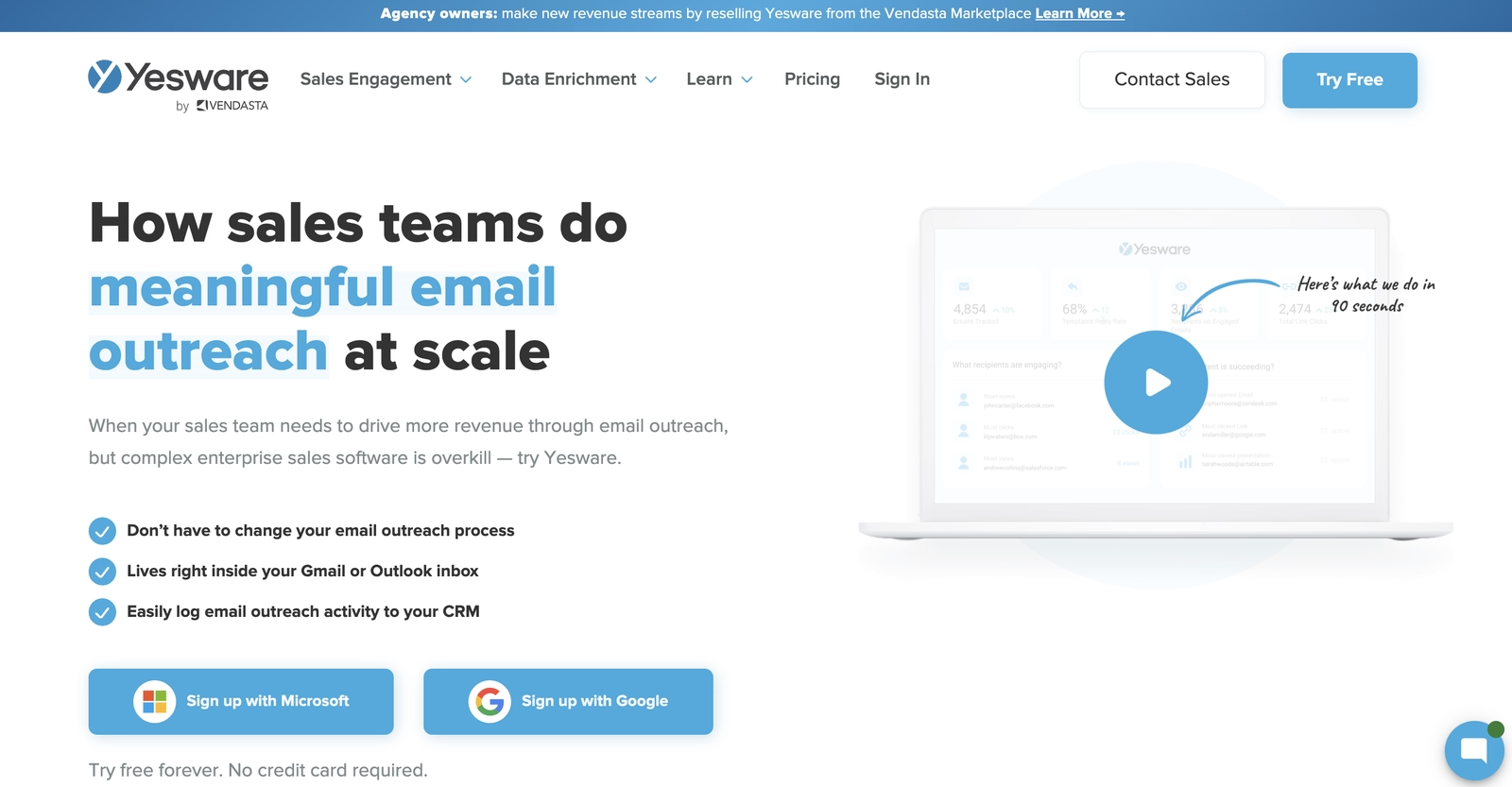
Yesware is a sales toolkit that works inside an email inbox. It gives sales teams data and productivity tools to track email opens, use templates, and automate outreach campaigns.
The platform helps representatives manage their pipeline and follow up with prospects. This supports the work of a sales development representative.
Yesware's Main Features
- Tracks email opens, link clicks, and attachment activity.
- Integrates directly into Gmail and Outlook inboxes as an add-on.
- Provides email templates to help scale outreach efforts.
- Includes email scheduling and notifications to manage follow-ups.
How Yesware Compares To B2B Rocket
Average Review score: 4.4/5 stars based on 819 G2 reviews.
- Yesware integrates directly into Gmail and Outlook inboxes as an add-on. This approach keeps all sales activities within the user's email client, unlike B2B Rocket, which operates as a separate platform.
- It provides detailed tracking for email opens, link clicks, and attachment activity. This offers more specific engagement data compared to the general automation focus of B2B Rocket.
- The tool allows sales teams to use and manage email templates from inside their inbox. This differs from B2B Rocket, where outreach sequences are built on an external system.
- Its direct integration with CRMs helps maintain data consistency between the inbox and sales records, a process that requires separate management with B2B Rocket.
Potential Downsides Of Yesware
- Yesware operates as an inbox add-on, so its automation features are less extensive compared to the standalone platform B2B Rocket provides for complex outreach.
- The tool focuses on outreach within the inbox and lacks the dedicated lead generation functions that B2B Rocket offers to find new prospects.
- Its design as a simple inbox tool can be a limitation for teams that need to run highly complex automation campaigns, a task for which B2B Rocket is specifically built.
Budget and Pricing Considerations
B2B Rocket operates on a custom-quote model, so its pricing is not public. In contrast, Yesware offers transparent tiers: Pro at $15 per seat per month, Premium at $35, and Enterprise at $65. This makes Yesware a more predictable and budget-friendly option for initial adoption.
Which One Should You Go With?
Many variables factor into the selection of a B2B Rocket alternative, including your team's specific needs and existing sales stack. This guide reviewed several options to help you create a shortlist for further evaluation.
If your goal is to delegate sales functions to a digital workforce, 11x offers a different approach. Its autonomous agents manage parts of the sales process, which contrasts with tools designed to assist human representatives.




